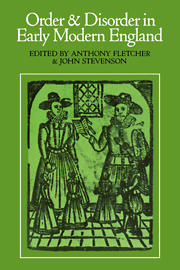Book contents
- Frontmatter
- Contents
- Notes on Contributors
- List of Abbreviations
- Preface
- Acknowledgements
- Introduction
- 1 Puritanism and Social Control?
- 2 Popular Religion and the Pilgrimage of Grace
- 3 Honour, Reputation and Local Officeholding in Elizabethan and Stuart England
- 4 The Taming of the Scold: the Enforcement of Patriarchal Authority in Early Modern England
- 5 Order and Disorder in the English Revolution
- 6 Drainers and Fenmen: the Problem of Popular Political Consciousness in the Seventeenth Century
- 7 Gender, Family and the Social Order, 1560–1725
- 8 The ‘Moral Economy’ of the English Crowd: Myth and Reality
- Index
- Index of places
4 - The Taming of the Scold: the Enforcement of Patriarchal Authority in Early Modern England
Published online by Cambridge University Press: 09 October 2009
- Frontmatter
- Contents
- Notes on Contributors
- List of Abbreviations
- Preface
- Acknowledgements
- Introduction
- 1 Puritanism and Social Control?
- 2 Popular Religion and the Pilgrimage of Grace
- 3 Honour, Reputation and Local Officeholding in Elizabethan and Stuart England
- 4 The Taming of the Scold: the Enforcement of Patriarchal Authority in Early Modern England
- 5 Order and Disorder in the English Revolution
- 6 Drainers and Fenmen: the Problem of Popular Political Consciousness in the Seventeenth Century
- 7 Gender, Family and the Social Order, 1560–1725
- 8 The ‘Moral Economy’ of the English Crowd: Myth and Reality
- Index
- Index of places
Summary
Fears of an impending breakdown of the social order have been common in many periods of history. At no time were they more widespread, or more intense, than in early modern England: the ‘crisis of order’ detected by modern historians in the sixty years before the civil war accords with the perceptions of many people in that period. Among the causes and symptoms of the apparently growing instability were those now familiar problems of excessive population growth, inflation, land shortage, poverty and vagrancy, all of which have attracted the attention of recent scholars. There are those who, like Peter Laslett, stress the stability of English society throughout the entire pre-modern period, and dismiss the signs of tension as the minor conflicts that exist in even the most smoothly functioning social system. Few contemporaries would have agreed with them. It could no longer be safely assumed that all Englishmen and women were bound together in that interlocking network of households and communities on which, according to the prevailing orthodoxy, stability depended. ‘Was there ever seen less obedience in youth of all sorts, both menkind and womenkind, towards their superiors, parents, masters and governors?’ the puritan Philip Stubbes demanded in the 1580s, echoing a common preoccupation. Even the patriarchal family, the linch-pin of the whole structure of order, appeared to be threatened.
These anxieties were not confined to puritan moralists.
- Type
- Chapter
- Information
- Order and Disorder in Early Modern England , pp. 116 - 136Publisher: Cambridge University PressPrint publication year: 1985
- 42
- Cited by



